Black cast reimagines the wild west in Sydney Festival show Dark Noon
Sydney Festival marquee show Dark Noon inverts the usual westerns script, as a black South African cast depict three centuries of US history in 100 frenetic minutes: ‘This is what it looks like when you write someone else’s history. Can you see how ridiculous it is?’
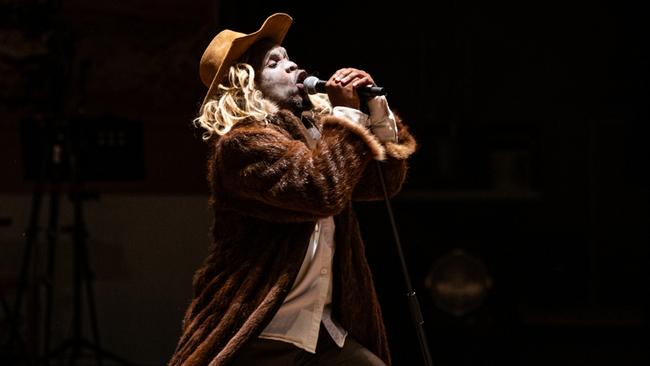
At a time of increasing political polarisation, Danish director Tue Biering reflects on how his country’s theatre industry “is a left-wing church of ‘right’ believers’’. He clearly means right-on rather than right-wing, and he acknowledges he shares many of the cultural establishment’s left-leaning views and assumptions.
Despite this, Biering has built an international reputation for using wildly unconventional methods to challenge his own prejudices and those of his audiences – from having them attend a mock slave auction to setting a “trap” that pressures them into applauding a real conservative politician.
“I try to do my very best at creating this space where a broad, diverse part of society can meet,’’ the writer and director says in the grey half-light of a wet and wintry Copenhagen morning. Biering is speaking over Zoom and it’s so chilly in his native city, he wears a beanie, thick scarf and bulky sweater inside the office of his experimental theatre company, fix + foxy.
The agent provocateur worries about increasing polarisation in Europe – over immigration and other issues – and he argues “we have to coexist’’ with those whose views or values are diametrically opposed to our own. People retreating to their respective ideological trenches “is a huge challenge and that is what we’re facing on a daily basis … Though we are not agreeing about different things, we have to realise that we can’t send anybody to an island and you should (instead) have a conversation with them,’’ he says.
The Danish experimentalist has put his money where his mouth is. In his award-winning stage show Rocky!, staged in 2017, minutes before the final bows were taken, a right-wing politician appeared on stage and reviewed the show from a conservative perspective. Biering explains with a light, wry laugh: “At the very end, the actor and this politician went on stage together and took the applause. So you (the audience) had this kind of huge dilemma: ‘Should I applaud, or should I not applaud?’ And that, I think, was interesting.’’
Rocky!, which won a host of Danish theatre awards and was declared show of the year at the 2022 Edinburgh Fringe Festival, is described as an exploration of “the triumphant loser” who transcends his social background. The show goes on to ask: “What if millions of Rockies are out there and have had enough of being laughed at and looked down upon, and now they want revenge (against progressive left-wingers)?’’
Rocky’s creator says this work, which features a pig’s carcass on stage, does not merely reference rising populism in Europe and America. “It is all about exploring my own limited ability to have a conversation with the other,’’ he says. “I have been mocking the Rockies as an artist, but I had also not been super honest about how I would share my space with an artist of other beliefs.”
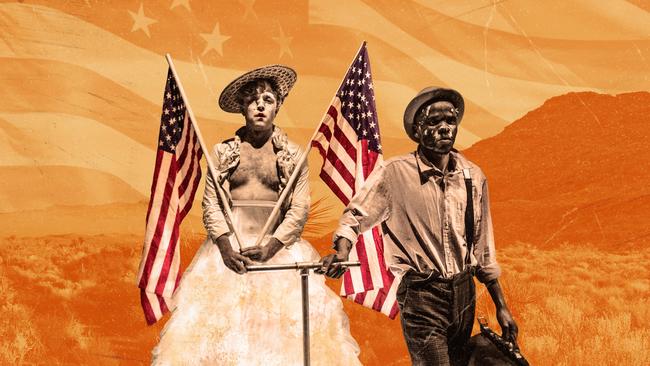
Now, the 51-year-old director is to bring another subversive production, Dark Noon – which up-ends the conventions and mythologies of western films – to the 2025 Sydney Festival. Written and directed by Biering, Dark Noon is a retelling of the 19th century American Wild West that somehow depicts, in 100 frenetic minutes, three centuries of US history. It is performed by a mostly black South African cast in whiteface and comically bad blonde wigs, and it explores everything from the push into America by impoverished European migrants, to the slave trade and the gold rushes.
In double quick time, the cast build a frontier town on a dirt floor and through tonal shifts that lurch from high-spirited humour to quiet devastation, the show foregrounds the victims of colonial settlement, including Native Americans, Chinese miners and enslaved blacks.
South African co-director Nhlanhla Mahlangu says this hyperkinetic production is a retort to the notion that history is “written by the victors’’. Mahlangu has said: “Africans had their history written by Europeans, and we are inverting that idea. We’re showing you, ‘This is what it looks like when you write someone else’s history. Can you see how ridiculous it is?’ That’s why we are so absurd when we are inside the world of Dark Noon.”
The show has toured to New York, Paris and the Edinburgh Fringe Festival, and has garnered many five-star reviews, with The Observer describing it as “a savage and gripping live documentary that tells the 300-year history of the American west in 100 uproarious minutes’’. Time Out describes the work, which combines live video with live performance, as “outrageously entertaining’’. Calling it a “myth-busting masterpiece”, Fleabag creator Phoebe Waller-Bridge says the show “had an almighty impact on me which will continue to unfold for a very long time”.
A festival centrepiece, Biering’s production offers its irreverent take on western films by way of Europe’s incendiary immigration debate. To link the two, he engaged black South African rather than native American and African-American actors. “I wanted to reverse the narrative and make it a narrative about European migration (to America). So for me, it’s more about letting somebody else tell my story, instead of having me telling somebody else’s story,’’ he says.
He chose the western genre as a framing device “because I feel that first of all this is a genre that is so strong in all of us – I can go anywhere in the world and talk about the cowboy western movies everybody knows. I mean, what does that say?”
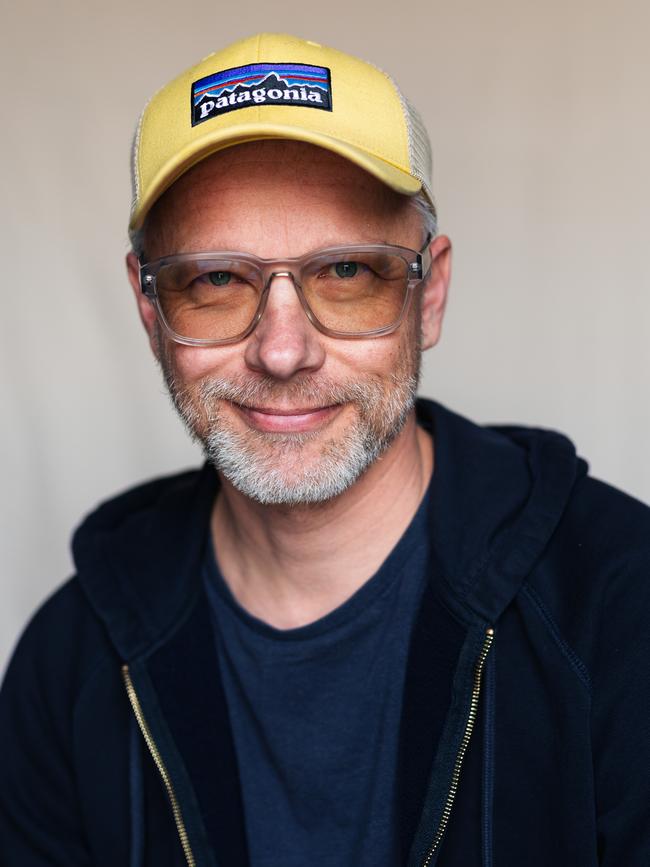
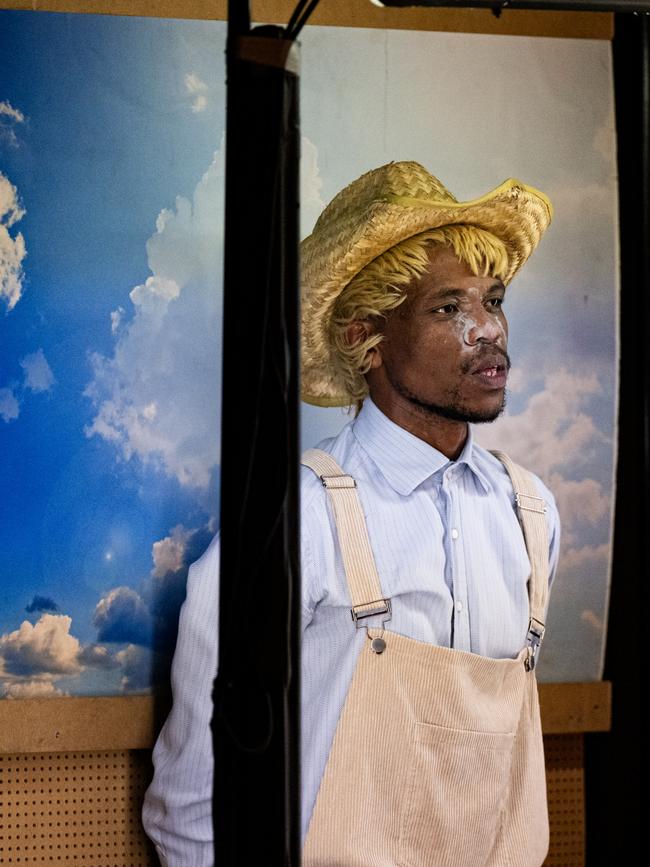
Dark Noon is clearly a play on High Noon, the revisionist 1952 cowboy classic about a marshal’s lonely fight against a gang of killers. But the theatre piece doesn’t solely reference the film, which featured Gary Cooper in the lead role and divided Hollywood over its depiction of a frontier town that refuses to back its sheriff in the face of evil. When it comes to Dark Noon’s cinematic references, Biering says “High Noon is just a small bit of the big puzzle of all these narratives, and I wanted to make it more complex’’.
The writer-director says cowboy films have strongly “stereotyped narratives about the good and the bad. The moral conquest in a cowboy western movie is very obvious … So it is a framework (on which) you can put down anything. And that was a really interesting device to be working on with this cast of South African actors.’’
Given that white actors donning blackface is offensive, is Biering being intentionally provocative by presenting black actors in whiteface? The Dane, a father of two school-aged children, says in his calm, unruffled way: “It’s more about being consistent in the concept of reversing narratives and … I really wanted to address something about the representation of white blonde people in movies and in history. And of course, it’s also a commentary on minstrel shows.’’
Dark Noon also looks at how slavery played a role on the American frontier, and, contentiously, some patrons will find themselves taking part in a slave auction. Biering says of this: “From my experience, nobody has been shocked about it, actually. In almost all my work, I have had audience participation in one way or another … and leaving the audience not addressed, not engaged, would be so strange to me.’’
At the end of the show, the South African cast speak about their personal experiences of violence, guns and law and disorder during the apartheid and post-apartheid eras. They also use slapstick and uproarious humour to get their message across.
“Humour is a tool our company uses,’’ says Biering. “The company’s name is fix + foxy – it says something about how we want to fix things in a foxy way.’’
Despite the show’s international success, Biering insists that “the way I work is really terrible, because I get an idea and I write it down, and I apply to (Denmark’s) art council for it, and if I get money, I have to do the show.’’
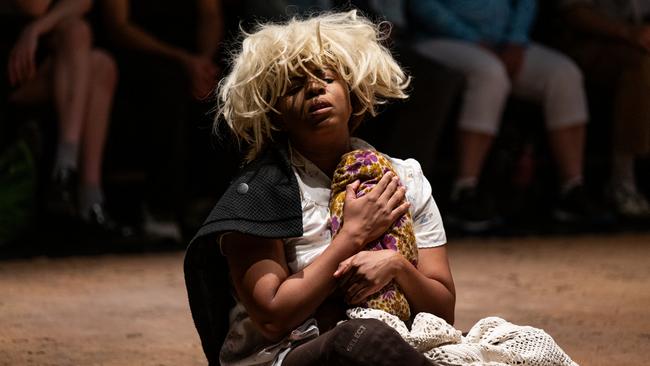
He admits he secured funding for Dark Noon before he had decided what film he could “build it upon’’. Then he started bingeing on westerns and interviewing the genre’s experts until he felt overwhelmed. “I was super desperate. I had watched so many movies,” he says.
His breakthrough came when he picked up a much-thumbed history book which partly focused on the mass migration of poor Europeans to the US that started in the 1800s. “In the beginning of European migration, there was starvation in Europe, especially in Scandinavia. And then I started reading this book, and it was so obvious to me that this was the script.’’
Fix + foxy often works with under-represented communities, although Biering clarifies that “it’s a lot about my curiosity to meet those people I have maybe stereotyped ideas about. I also use my work as an alibi to do the first phone call, to say, ‘I’m a director, I’m doing a production.’ I wouldn’t have done that as a private person.’’
The theatre-maker won’t make it to Dark Noon’s Sydney Festival outing, because it coincides with the January opening of his largest-scale work to date.
He jokingly calls this work, titled The State, “the most incredibly stupid production I’ve ever done’’ because of its ambition and complexity.
He explains this 26-episode show aims at “shaking” Danish society by having people who otherwise have nothing in common, or who may have clashing opinions, meet up. “We’re producing a lot of episodes with real living people in the city of Copenhagen. So it’s a huge installation … It was an old dream from me, for me to stage a whole city.’’
This research-heavy behemoth involved a lot of work interviewing and casting ordinary citizens, and uses video to “tell a story that is so complex, about how it is to be a person living in a society that is built upon democratic rules. But at the same time we are living in a society that is more and more polarised. How do we manage to live together though we are so different and of such different opinions? And sometimes we are also going to a violent extreme … So it’s also about shaking society actually, and making people meet each other.’’
Another of his shows that took audience participation to new levels was called Avatar Me and was based on a “super, super simple’’ concept. Again, ordinary people living in Africa, Mumbai or Brazil strapped a camera to their chests and invited an audience member sitting at the end of a streaming link to walk around in their shoes.
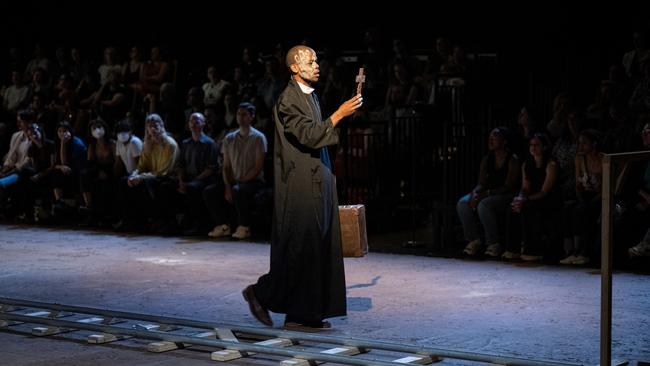
He jumps up from his chair to demonstrate. “So you (the audience) are becoming a young woman in an area in South Africa where it’s very dangerous for young women to go out on the street. Or you’re living in Mumbai and having trouble with your family because your girlfriend is Hindu. And there was a man taking hormones and being in transition to become a woman in Brazil.’’
A recurring theme emerges of theatregoers having their own prejudices and stereotyped ideas overturned by getting to know those outside of their usual circle.
While Biering’s star is rising internationally, he says modestly that there are “so many amazing artists around the world, I just feel like a tiny fish in a big sea of talent’’.
Most of the time, he is based at home in Copenhagen. “I have two kids. I really don’t want to spend most of my time far away,’’ he says. His children are aged 10 and 16, while his wife, Marie Biering, is a visual artist and set designer. “Formerly we were having a company and working together. But right now, I think she would prefer to not work with me. It’s too complicated,’’ jokes this great experimenter for whom, it seems, no show is too complex, or too edgy.
Dark Noon runs from January 9 to January 23 at Sydney Town Hall, as part of the Sydney Festival


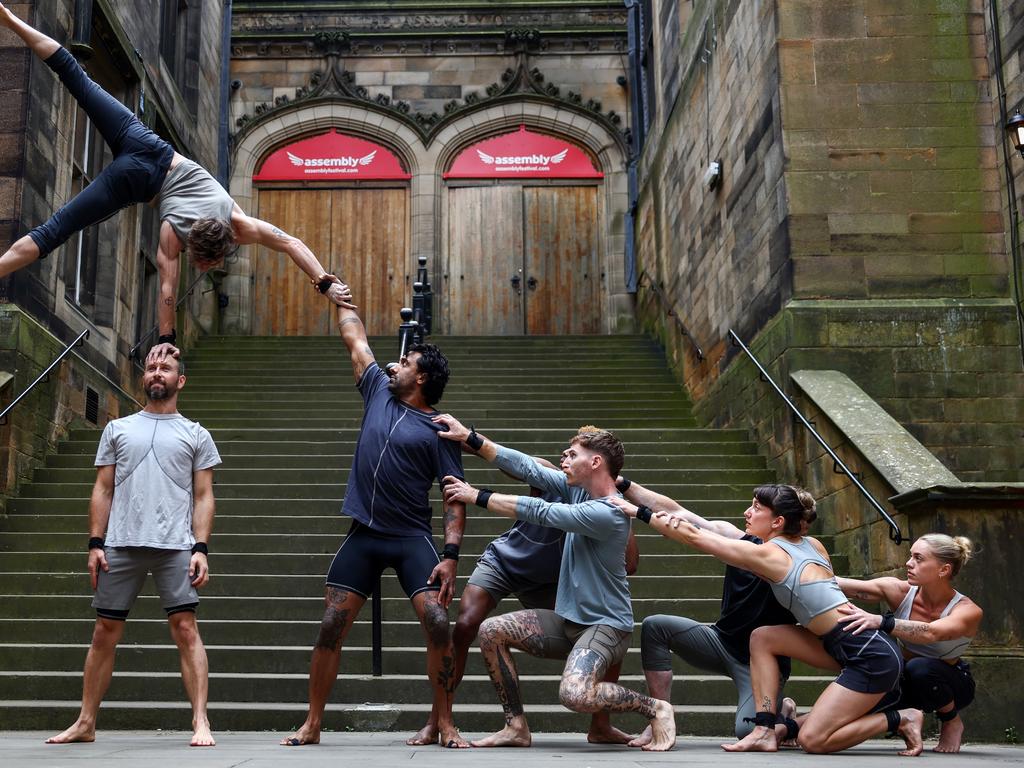


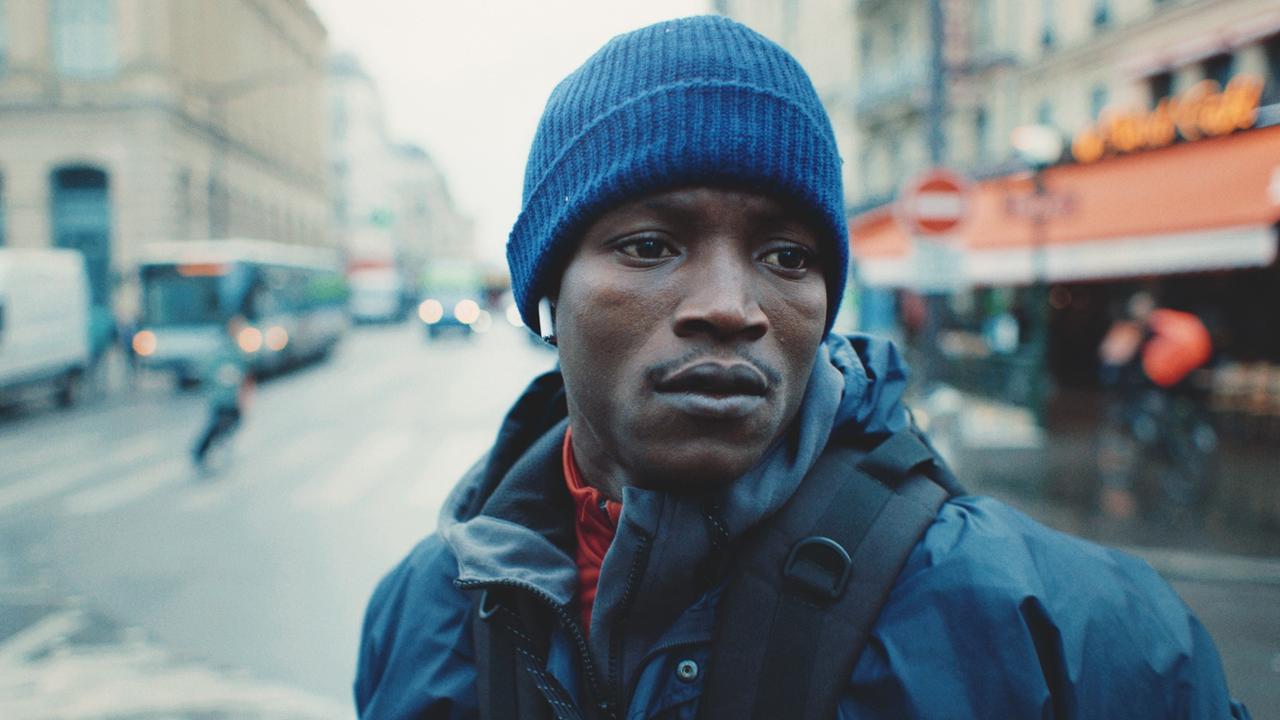
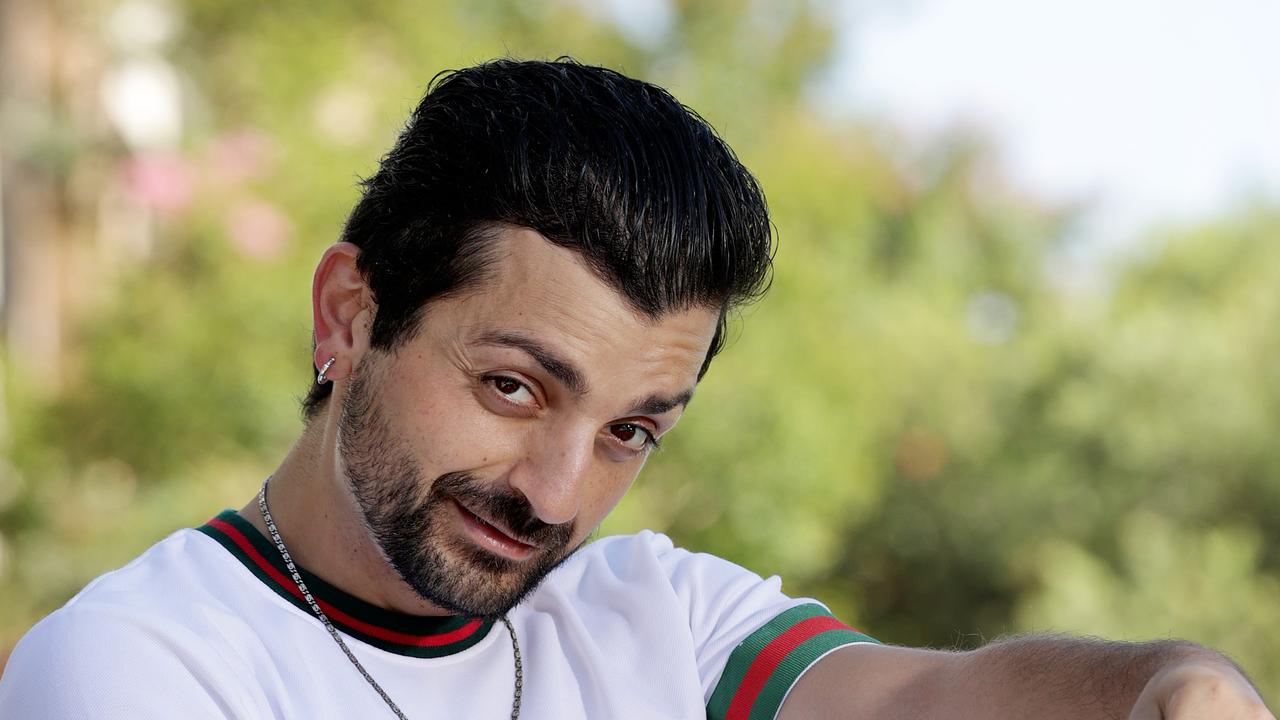
To join the conversation, please log in. Don't have an account? Register
Join the conversation, you are commenting as Logout